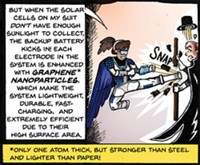Advertisement
Grab your lab coat. Let's get started
Welcome!
Welcome!
Create an account below to get 6 C&EN articles per month, receive newsletters and more - all free.
It seems this is your first time logging in online. Please enter the following information to continue.
As an ACS member you automatically get access to this site. All we need is few more details to create your reading experience.
Not you? Sign in with a different account.
Not you? Sign in with a different account.
ERROR 1
ERROR 1
ERROR 2
ERROR 2
ERROR 2
ERROR 2
ERROR 2
Password and Confirm password must match.
If you have an ACS member number, please enter it here so we can link this account to your membership. (optional)
ERROR 2
ACS values your privacy. By submitting your information, you are gaining access to C&EN and subscribing to our weekly newsletter. We use the information you provide to make your reading experience better, and we will never sell your data to third party members.
Environment
Cooper Union Wins Chem-E-Cars Competition
Chemical engineering students power vehicles with alternative fuels
by Rachel Petkewich
November 7, 2007

Baking soda and vinegar helped a team of chemical engineering students from Cooper Union for the Advancement of Science & Art, in New York City, win the 2007 Chem-E-Cars competition on Nov. 4. The national finals for the alternative-fuel-vehicle competition were held in Salt Lake City at the annual meeting of the American Institute of Chemical Engineers (AIChE).
At this year's event, the shoebox-sized vehicles had to transport 350 mL of water exactly 67 feet. But the teams weren't told the cargo size or the distance until shortly before the start. The challenge was to calculate how much fuel would be needed to power the cars so that the chemical reaction would end and the vehicles would stop on the finish line. Remote controls or other devices were not permitted.
With 28 schools competing, Cooper Union's car came closest to the finish line and won the $2,000 top prize. Team captain Mukarram Razvi says the five-person team had worked on their design since August.
The team from Carnegie Mellon University, in Pittsburgh, finished second with a vehicle powered by a copper-zinc battery. The University of Oklahoma team garnered third place with its vehicle fueled by hydrogen peroxide and potassium permanganate.
AIChE introduced the annual competition in 1999 as a fun and practical way for undergraduate students to apply chemical engineering principles to move vehicles. Previous contestants have gone on to work in fuels research at public and private organizations, according to AIChE.
- "Trailer" of 2006 competition
- Check back for the 2007 Trailer in a few weeks.
- UCLA Chem-E-Car 2007 test run 1
- Watch the Bruins prepare for the competition.





Join the conversation
Contact the reporter
Submit a Letter to the Editor for publication
Engage with us on Twitter